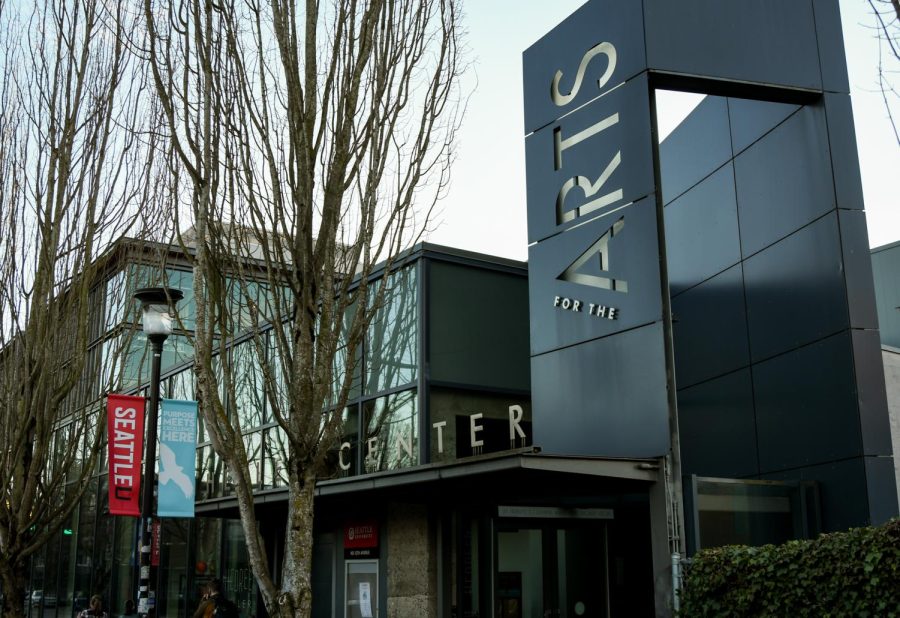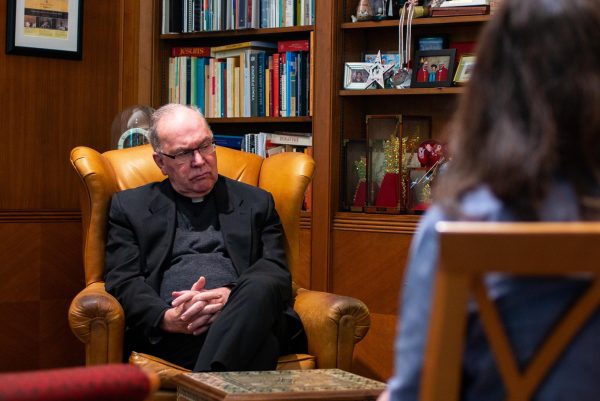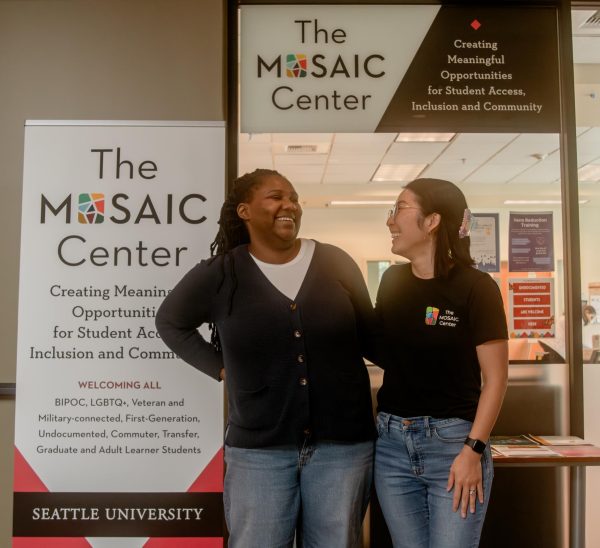Seattle Theater Students and Professionals Look Forward to the Return of Live Theater
The Lee Center for the Arts, home to Seattle University’s theater.
If there was one business model that was uniquely predisposed to suffer during the COVID-19 pandemic, it was theater. The act of crowding a large mass of strangers into a tight room for a prolonged period of time was a potentially fatal practice for several months during the height of the COVID-19 pandemic. With Seattle’s vaccination rate now at 86.9% for people over 12 years old, theaters around King County are preparing to get back to live performances.
Throughout the pandemic, theaters worked to continue their artistry digitally, which led to a great deal of experimentation.
Jocelyne Fowler, the production manager of Seattle Shakespeare Company, explained what the transition online looked like for her team.
“We just readjusted what kind of programming we were going to do and how we were going to get that out to the people,” Fowler said. “We did staged readings of certain Shakespeare shows, we have been in the process of doing an audio drama … and we did a scavenger hunt. We took it a little outside of performance while still engaging the audience as best we could.”
While a great deal of the shift to online entertainment was simply a stop-gap solution until live performances could resume, there were some unexpected benefits.
Alexis Bailey, a third-year theater and forensic science student, underscored that the Bodies of Water theater production, which brought together students and faculty from the University of Washington, Cornish College of the Arts and Seattle University, would have been impossible without live networking and streaming services.
“It was something that couldn’t—I don’t think would—have ever happened if we were in person and that gave so many students opportunities to not only meet other students from these schools in the same area and field but also meet professionals from different backgrounds,” Bailey said.
However, the increased opportunity to network with other theater artists did not remedy the struggles of acting and writing from home. It is certainly stressful for all students being online, but acting into a webcam is an especially difficult task.
Audrey Hanson, a third-year student studying theater and history, explained the pressure that arises from performing from home.
“You have to tune in so much to who you are as an individual, because you don’t have any kind of buffer—and I mean that in a lot of ways—you don’t have any other people that you can act off of, and you don’t have really your own space,” Hanson said. “When you’re doing an online show, your room turns into your theater. That can be really mentally challenging for a lot of people.”
Theater students attempted to counteract the negative effects of shifting online by creating student groups where students could find mutual support.
“That has been really important in the theater department just for creating a space where students can, if not just vent, also try to reform the theater department in many ways, which is really crucial during this time when we’re not meeting in person,” Hanson said.
Daniel Anson, a fourth-year theater student, echoed the sentiment that students need social outlets during the pandemic.
“The shows have definitely been challenging and a good learning experience just in overcoming those challenges,” Anson said. “I get a lot of my needs met through being social and when that’s on the zoom, it makes it harder for me to connect to the material.”
While the change to virtual entertainment was not easy, it did incentive students to find new ways to share their talents.
“The department has been very good about giving us the equipment that we need and teaching us how to use webcams and software, so that we can still make high- quality shows,” Bailey said.
The tension between wanting to continue making quality art and the exhaustion created by performing from one’s own bedroom is not exclusive to the Seattle U theater community. On the casting side, directors and managers face a different industry than just two years ago.
“During the pandemic, people definitely left. I see it a lot because I deal a little bit more with the production side. I see it a lot with stage managers who left, so the pool of stage management people is much smaller than it used to be, and people book-out fast, and we see that with actors too,” Fowler said.
Actors have felt the pressure to either leave acting entirely or find temporary work in other markets.
Nicholas Parsons, a Seattle U theater program alum who graduated in 2019, described his work in theater after graduation, and how the pandemic halted the progress of many developing acting careers.
“I was one of the few fortunate graduates who was able to start working professionally right away, and I got to do two professional shows, one of which I got to complete and one of which got cut short,” Parsons said. “So many amazing, talented, educated people who are super qualified to be in this field have completely jumped ship, because it was no longer sustainable. The worst part was, no one could blame them.”
While the job market for actors essentially evaporated in March of 2020, the industry has started to open back up since then.
“Theatre people have a lot of experience not working. It’s not anything new. They’ve been telling us for our entire lives, ‘you’re going to go out into the world, and good luck.’ It’s hard and it’s not been looking good, but it’s starting to look a lot better than it did at the beginning of the pandemic,” Hanson said.
Looking forward, nearly every major regional Seattle theater is opening in the next three weeks. The Seattle Shakespeare Company is opening “Drums and Colour” Feb. 15. The Seattle Rep opened “Fannie,” a one-woman musical, Jan. 14. The Seattle Public Theater is opening “Mala” Jan. 28. The ACT is opening “Hotter than Egypt” on the same day. After nearly two years of online and outdoor performances, the ability to get back into the seats and view live theater is both exciting for audiences and a financial necessity for the entertainment industry.
Seattle U theater, which had the opportunity for in-person learning last quarter and is preparing to return to in-person instruction with the rest of the university in February, is also looking forward to performing in a live setting.
Daniel Anson is preparing for the completion of his honors project, an original play entitled “Unravel,” which will be showcased late spring quarter. In addition, the Seattle U theater department is preparing for their performance of “Eurydice.”
Returning to live theater will not be a seamless process. On Broadway, COVID scares have momentarily halted productions and caused stress for both crew and cast.
“The biggest excitement is getting people back in the theater, and it will also be the biggest hurdle,” Fowler said. “We are excited to welcome people back in, but the biggest hurdle will be making sure that we are able to provide the safest environment for everybody.”
While there will certainly be challenges, the past two years have been particularly bleak for theater performers, and artists are excited to harness new opportunities to share the dramatic form with others.
“I recently accepted a job as the director of theater operations at a summer camp in the San Juan Islands … Even though it’s going to look a lot different than it used to be, I can still proudly say that for the first time since the pandemic began [that], I’m taking my first step back into the industry that has brought me so much joy,” Parsons said.
As artists prepare to return to the stage, theater management focuses on bringing audiences back to live entertainment, and to keep them safe from COVID-19.
“The important thing to know is, everybody who works for us at Seattle Shakespeare is fully vaccinated, we’re encouraging everybody to get boosted, and anybody who enters the space has to show that they’ve been fully vaccinated, which helps to keep a nice medium of safety,” Fowler said.
After an economic recession and the complete shuddering of an industry, Seattle theater is preparing for an encore performance. Their success will depend upon the support of audiences and the communities which have formed around theaters on a collegiate, regional and national level.











